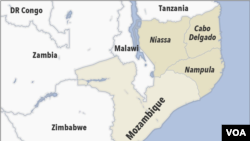The ongoing violence in Mozambique’s northern province of Cabo Delgado could spread to neighboring provinces, officials and experts warn.
In the province of Niassa, west of Cabo Delgado, officials are expressing concerns over a possible spillover of the armed conflict unfolding in the neighboring province.
“We are very concerned about terrorism in Cabo Delgado,” Arnaldo Chefo, the chief police commander in Niassa, told reporters on Tuesday. “Being neighbors to that province, we have to be constantly vigilant so that terrorists do not penetrate our province.”
A growing Islamist insurgency has been raging in Cabo Delgado for over three years. Since the first attack in 2017 by a militant group known locally as al-Shabab, more than 2,000 people have been killed and more than 500,000 others have been forced to flee their homes, according to the United Nations.
Militants linked to al-Shabab, which is considered the Mozambique affiliate of the Islamic State terror group, have reportedly carried out more than 600 attacks since the beginning of their insurgency.
The militants have taken control of territory in Cabo Delgado, including a strategic port, and burned dozens of villages across the resource-rich province.
Seeking new foothold
Bordering Cabo Delgado to the west, Niassa province is currently home to tens of thousands of internally displaces persons (IDPs) seeking refuge from the violence.
“Nothing can prevent insurgents from mixing with the displaced and eventually settle in Niassa,” said Mohamad da Costa Ali Yassine, a former member of the Mozambican parliament.
Al-Shabab “is a group that has been expanding as it wins more battles on the ground,” he told VOA.
The U.N. says most of the IDPs have been settling in southern districts of Cabo Delgado as well as in Niassa and Nampula, a province that lies to the south.
Some experts say the militants may seek to build a presence in other provinces in northern Mozambique.
Joao Mosca, director of the Rural Observatory in Mozambique, says the militants have managed to garner a level of support among the impoverished population of the north.
“It is necessary to investigate the problems that cause part of the population to support these militant groups, many of whom are local people,” he told VOA, adding that “the military option alone will not solve the conflict."
Mosca added that northern part of Mozambique has high levels of poverty and economic inequality, noting that if such issues aren’t addressed effectively, “the conflict will continue” to spread throughout the region.
Increased attacks
Last week, heavy clashes broke out between government troops and militants in the village of Monjane near the coastal town of Palma, destroying at least 40 homes and causing a new wave of displacement.
This week, Cabo Delgado police confirmed a new attack carried out by the insurgents in the Quitunda village near a major gas project.
The growing violence in Cabo Delgado has forced the French energy firm Total to remove about 500 of its 3,000 employees.
“In view of the evolving security situation in Cabo Delgado province, [we] decided to reduce the number of personnel present at the Afungi site,” the energy giant said in a statement on Monday.
Speaking on the condition of anonymity for fear of workplace retaliation, a local worker in Afungi told VOA “a large number of workers have already been evacuated” from the project site.
Residents say the recent violence and the growing presence of Islamist militants in the area have caused panic and despair among the local population.
“The situation remains tense here,” a local resident told VOA. “Many people are fleeing to Palma on foot. We live in a crisis.”
Mozambique officials, however, assure the displaced people that they will soon be able to return to their homes as government forces have been retaking control of territory lost to the extremists.
“The port of Mocimboa da Praia is no longer under the control of the enemy,” Defense Minister Jaime Neto said in a Thursday briefing, referring to a port overrun by the militants in August 2020.
“They are active in the district, but our Navy has strengthened its presence there,” the minister said.
The United States has offered to assist the Mozambican government in combating the insurgency in the north.
“What we need to do is make sure that we in the United States are making available to our Mozambican partners every capability that we have to help them degrade and ultimately defeat that terrorist threat,” Nathan Sales, the U.S. coordinator for counterterrorism, said in December following a visit to Mozambique.
Ramos Miguel in Maputo, and Amancio Vilanculos and Andre Baptista of VOA’s Portuguese Service contributed reporting from Washington and Manica, Mozambique, respectively.




